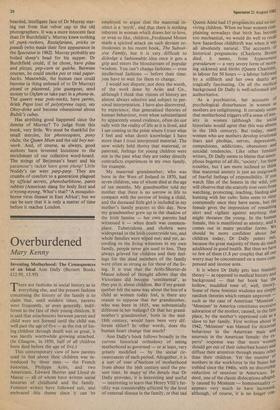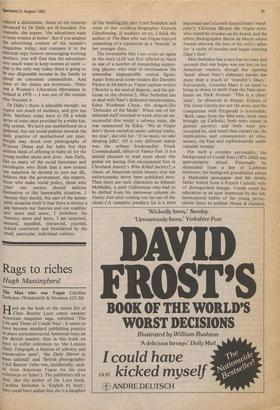Overburdened
Mary Kenny
There are fashions in social history as in everything else, and the present fashion concerning the history of the family is to claim that, until modern times, parents were frequently, or even generally, indif- ferent to the fate of their young children. It is said that attachments between parent and child were not formed until the child was well past the age of five — as the risk of los- ing children through death was so great, it was hardly worthwhile growing attached. (In Glasgow, in 1850, half of all children born died before the age of five.)
This contemporary view of how parents used to feel about their children was in- troduced by three men• — the French historian, Philippe Aries, and two Americans, Edward Shorter and Lloyd de Mause — all of whom have written social histories of childhood and the family. Feminist writers have followed suit, and embraced this theme since it can be employed to argue that the maternal in- stinct is a 'myth', and that there is nothing inherent in woman which draws her to love, or even to like, children.,Ferdinand Mount made a spirited attack on such deviant or- thodoxies in his recent book, The Subver- sive Family, but it is very difficult to dislodge a fashionable idea once it gets a grip and enters the bloodstream of popular • twisdom. You can't change fashions — even intellectual fashions — before their time: you have to wait for them to change.
I would not dispute, nor deny the worth, of the work done by Aries and Co., although I think that visions of history are almost always selective and subject to per- sonal interpretation. I have also discovered, by experience, that generalised theories of human behaviour, even when substantiated by apparently sound evidence, often do not tally with the reality of life as it is lived, and I am coming to the point where I trust what I feel and what direct knowledge I have more than I trust interpreted material. The now widely held theory that maternal, or paternal, feelings for young children were not in the past what they are today directly contradicts experiences in my own family, for example.
My maternal grandmother, who was born in the West of Ireland in 1870, had seven children, one of whom died at the age of ten months. My grandmother told my mother that there is no sorrow in life to compare with the sorrow of losing a child, and the deceased little girl is included in my mother's family prayers to this day. Now my grandmother grew up in the shadow of the Irish famine — her own parents had witnessed it — when death was common- place. Tuberculosis and cholera were widespread in the Irish countryside too, and whole families were wiped out; and yet, ac- cording to the living witnesses in my own family, people never got used to loss. They always grieved for children and their feel- ings for the dead members of the family were often as strong as for those of the liv- ing. It is true that the Aries-Shorter-de Mause school of thought allows that the Victorians did become 'sentimental', as they put it, about children. But if my grand- mother felt the same way about the loss of a child as women today feel, is there any reason to suppose that her grandmother, who was born in 1815, was substantially different in her feelings? Or that her grand- mother's grandmother, born in the mid- 18th century, would have been very dif- ferent either? In other words, does the human heart change that much?
Ann Daily's book follows broadly in the current historical orthodoxy of seeing motherhood as governed — or at least, very greatly modified — by the social cir- cumstances of each period. Altogether, it is a sort of tour d'horizon of motherhood from about the 16th century until the pre- sent time. In many of the details that Dr Daily provides, it is interesting and useful — interesting to learn that Henry VIII's fer- tility was considerably affected by the level of venereal disease in the family, or that sad Queen Anne had 15 pregnancies and no sur- viving children. When we hear women com- plaining nowadays that birth has become too mechanical, we would do well to recall how hazardous childbirth was when it was all absolutely natural. The accounts of historical pregnancies (Charlotte Bronte died, it seems, from hyperemesis gravidarum — a very severe form of morn" ing sickness) and births (Queen Charlotte, in labour for 50 hours — a labour followed by a stillbirth and her own death) are tragically fascinating. On all the medical background Dr Dally is well-informed and authoritative. As a psychiatrist, her accounts of psychological disturbances in women as mothers are enlightening. It certainly seems that motherhood triggers off a sense of anx- iety in women (although the social historians would agree that this was absent in the 18th century). But today, many women who are mothers develop irrational fears and phobias, nerves, depressions, compulsions, addictions, obsessions and suicidal tendencies. Like other feminist writers, Dr Daily seems to blame that amor- phous begetter of all ills, 'society', for these troubles, but I am more inclined to think that maternal anxiety is just an outgrowth of fearful feelings of responsibility. If You watch film of the lioness in the wild, you will observe that she scarcely ever rests from watching, protecting, teaching, feeding and hunting with her cubs: lions seem to sleep contentedly once they have eaten, but the female gives the impression of remaining alert and vigilant against anything that might threaten the young. In the human female, this is manifested as anxiety, and it comes out in many peculiar forms. We should be more confident about Our children today, Dr Daily points out, because the great majority of them do reach adulthood in good health. But then we have so few of them (1.8 per couple) that all our worry may be concentrated on a more com- pressed and intense area.
It is where Dr Dally gets into feminist theory — as opposed to medical history and background — that her book has the hollow, muddled tone of, well, theory. Some of these feminist wisdoms are simply random theories which remain unproven -- such as the case of American `Momism'. `Momism' in America constitutes excessive adoration of the mother, caused, in the first place, by the mother's oppressed role as a slave to her family. First written about in 1942, `MOmism' was blamed for distorted behaviour in the American male and neurosis in the American female: the ex- perts' response was that more women, should get out of their suburban homes and diffuse their attention through means other than their children. Yet the number of mothers in the work force in the States has trebled since the 1940s, with no discernible reduction of neuroses in Americans. In- deed, one of the classic dislocations alleged- ly caused by Momism — homosexuality -- appears very much to have increased, although, of course, it is no longer con' sidered a dislocation. Some of the theories advanced by Dr Dally are ill-founded. For example, she argues, 'the advertisers want to keep women at home'. But if you analyse the advertising content of the women's magazines today, and compare it to the editorial copy forever encouraging working mothers, you will find that the advertisers very much want to keep women at work that is the only way today there is going to be any disposable income in the family to spend on consumer commodities. And some of the claims are erroneous. There was a Women's Liberation Movement in Ireland in 1970 — I was one of the women who founded it.
Dr Daily's thesis is plausible enough: we expect too much of mothers, and give too little. Mothers today have to fill a whole series of roles once provided by a wider kin- ship system. We have put motherhood on a Pedestal, but our social policies towards the daily practice of motherhood are poor. People may drool over photographs of Princess Diana and her baby but they seldom think of offering to baby-sit for the Young mother alone next door. Ann Daily, like so many of the social historians and sociologists who think that a new system can somehow be devised to cure our ills, believes that the government, the experts, those who make social policy, those who `Plan' our society should address themselves to this lamentable situation. I daresay they should, but part of the lamen- table situation itself is that there is always a gap between our theories and our realities.
and more and more, I disbelieve the theories; more and more, I am surprised, amazed, appalled, entranced, puzzled, tickled comforted and bewildered by the small, particular, individual realities.



































 Previous page
Previous page